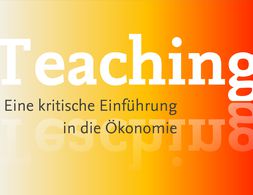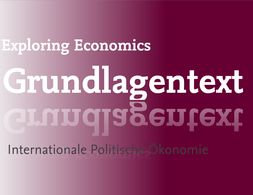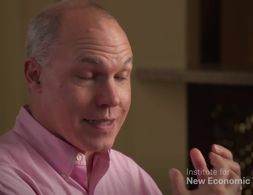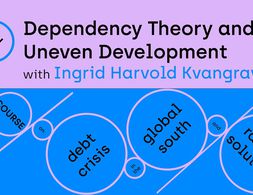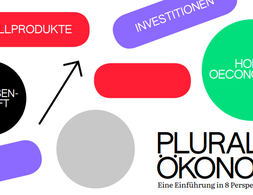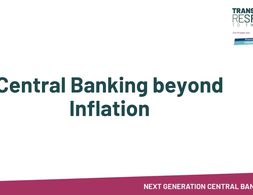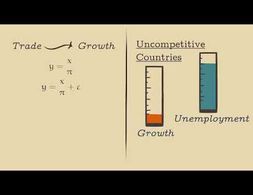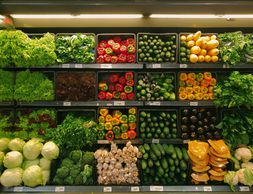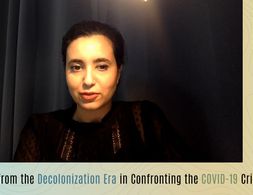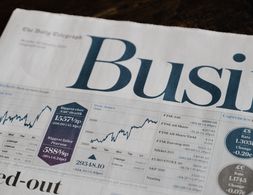70 Ergebnisse
Dani Rodrik, Professor of International Political Economy at Harvard's Kennedy School of Government, is teaching in this online session about the global rules under which the modern (free trade-focused) type of globalization operates and why, under such institutions, international community fails to deal with the climate change and pandemics.
Ziel dieser kritischen Einführung in die Volkswirtschaft ist es, auf knappem Raum unterschiedliche Sichtweisen auf wirtschaftliche Zusammenhänge darzulegen und damit die Basis für ein differenziertes Verständnis von Ökonomie und wirtschaftspolitischen Debatten zu liefern. In Zeiten einer integrierten Weltwirtschaft, rascher Veränderungen und internationaler Krisen liegt es nahe, Wirtschaft in ihrer internationalen Dimension in den Mittelpunkt zu stellen, anstatt wie gehabt meist nationale Ökonomien isoliert zu betrachten. Miteinander asymmetrisch verbundene Entwicklungen und Veränderungen in Nord und Süd, die auf globaler sowie zwischen nationaler und regionaler Ebene stattfinden, stellen somit einen zentralen Bezugspunkt dar. Daher der Titel des Buches: Ökonomie und internationale Entwicklung.
In diesem Text aus der Reihe "Exploring Economics - Foundations" werden die Grundlagen der Internationalen Politischen Ökonomie als interdisziplinäre wissenschaftliche Strömung dargestellt.
Professor Joseph Aldy from Harvard Kennedy School gives us some insights about how economics can set the balance between policymakers, scientists, employers and citizens.
The documentary features a talk of the US-American writer and economic theorist Jeremy Rifkin summarising the main points of his 2011 book "The Third Industrial Revolution."
This paper attempts to clarify how the European economic crisis from 2007 onwards can be understood from the perspective of a Marxian monetary theory of value that emphasizes intrinsic, structural flaws regarding capitalist reproduction. Chapter two provides an empirical description of the European economic crisis, which to some extent already reflects the structural theoretical framework presented in chapter three. Regarding the theoretical framework Michael Heinrich's interpretation of 'the' Marxian monetary theory of value will be presented. Heinrich identifies connections between production and realization, between profit and interest rate as well as between industrial and fictitious capital, which represent contradictory tendencies for which capitalism does not have simple balancing processes. In the context of a discussion of 'structural logical aspects' of Marx's Critique of the Political Economy, explanatory deficits of Heinrich's approach are analyzed. In the following, it is argued that Fred Moseley's view of these 'structural logical aspects' allows empirical 'applications' of Marxian monetary theories of value. It is concluded that a Marxian monetary theory of value, with the characteristics of expansive capital accumulation and its limitations, facilitates a structural analysis of the European economic crisis from 2007 onwards. In this line of argument, expansive production patterns are expressed, among other things, in global restructuring processes, while consumption limitations are mitigated by expansive financial markets and shifts in ex-port destinations.
Andrea Binder ist Expertin für Offshore Finanzen und humanitäre Politik. In ihrer kürzlich ausgezeichneten Dissertation hat sie sich damit beschäftigt, wie G...
A detailed introduction into dependency theory that rethinks its relevance to modern development challenges.
Dies ist eine Sammlung von Texten und Abbildungen zu verschiedenen ökonomischen Perspektiven. Zu Beginn der Sammlung wird jede ökonomische Perspektive einzeln vorgestellt. Im zweiten Teil werden alle Perspektiven miteinander verglichen, damit Gemeinsamkeiten und Unterschiede erkennbar werden. Die Texte in dieser Sammlung sind bewusst einfach gehalten, da sie eine Einführung in die Thematik darstellen. Die Sammlung ist zudem auf die Darstellung einiger Perspektiven beschränkt und deckt bei Weitem nicht das gesamte Spektrum pluraler Ökonomik ab.
How did the coronavirus almost bring down the Global Financial System? What effects does monetary policy have on inequality? What role do Central Banks have in the social-ecological transformation? How could Central Banks tackle climate change? What is Central Bank Digital Currency?
This panel was part of the conference "Next Generation Gentral Banking - Climate Change, Inequality, Financial Instability" 03. - 05.02.2021.
This panel was part of the conference "Next Generation Gentral Banking - Climate Change, Inequality, Financial Instability" 03. - 05.02.2021.
Balance of payments stability is of paramount importance for developing countries, both to secure the value of their domestic currencies as well as reliable foreign currency inflows. But how is that stability ensured and how important is the growth of exports for stability?
This short video visualizes the destabilizing effects financial markets can have on food prices, based on a paper by Jayati Ghosh. It introduces and explains the idea of future contracts and how those are used to speculate with basic food stuffs. After establishing the concepts, the video sketches out how the increase in those practices resulted in a substantial rise and later collapse of food prices around 2008 with severe consequences for many developing countries and their people.
A pithy, stimulating debate between three great economists on the heterogeneous character of economic thought
In this webinar for the Princeton Bendheim Center for Finance, Nobel Prize winner William Nordhaus explains the main problems regarding the economics of a low-carbon energy transition.
What made the false assumption that saving the economy at all cost during a pandemic so popular? This paper discusses different pathways through the COVID-19 pandemic at national and international level, and their consequences on the health of citizens and their economies.
This short video examining the concepts of rents and rent-seeking, and the high cost of orthodox liberal anticorruption policies.
Recovery from the Covid-19 crisis provides a chance to implement economic measures that are also beneficial from environmental and social perspectives. While ‘green’ recovery packages are crucial to support economies tracking a low-carbon transition in the short-term, green measures such as carbon pricing are also key to improving welfare in the long-term. This commentary specifies the need for carbon pricing, outlines its implications for our everyday lives, and explains how it works alongside value-based change in the context of climate action and societal well-being.
Von Schattenbanken, Geldschöpfung und Zentralbankkapitalismus.
Als Produktivität bezeichnet man das Verhältnis zwischen der Ausbringungsmenge (Output) und dem dafür benötigten Einsatz an Produktionsfaktoren (Input).
Mainstream economic narratives notably the concept of comparative advantage trade theory which assumes the equal balance of power between parties are deployed to support the merits of Global Value Chains that the global integration via trade creates mutual gains for both developed and developing countries This narrative is advanced in …
Die Klimapolitik der Bundesregierung reicht bisher nicht aus, um die katastrophalen Folgen der Klimakrise abzuwenden. Mit Blick auf die Bundestagswahl im September formulieren viele deutsche Parteien nun ehrgeizigere Ziele. Doch die Zeit drängt.
This film looks at the role economic growth has had in bringing about this crisis, and explores alternatives to it, offering a vision of hope for the future and a better life for all within planetary boundaries.
Tetteh Hormeku-Ajei, member of the Post-Colonialisms Today Working Group, discusses the role of the state in Africa during the COVID-19 pandemic.
Jihen Chandoul, a member of the Post-Colonialisms Today Working Group, discusses the impact of import-dependency on African food supply chains since the onset of the COVID-19 pandemic.
Yao Graham, coordinator of Third World Network- Africa, reflects on lessons learned from past Economic Partnership Agreements (EPAs), specifically as they relate to the Post-Cotonou Agreement.
The historian Nicholas Mulder talks about the Western sanctions against Russia in the context of the Ukraine Crisis. He explains that the current sanctions are unprecedented in terms of size, speed and scope, expected consequences as well as potential drawbacks and problems.
"Alexander Kravchuk is an economist and editor at Commons: Journal for Social Criticims, who has previously written about IMF conditions on loans to Ukraine. Jacobin’s David Broder asked him about the country’s economic situation and why debt cancellation is important if Ukrainians are to be able to shape their future." (quote from the interview)
In this piece Alexander Kravchuk gives an overview over the history of dept dependency in Ukraine, highlighting especially the role of international creditors and the negative socio-economic impacts of debt dependency for the Ukrainian economy.
In this short essay, Jayati Ghosh gives an overview over the multiple ways in which the economic "fall-out" of the War in Ukraine is hitting economies and societies in the developing world.
Diese Publikation der Rosa Luxemburg Stiftung erläutert grundlegende Zusammenhänge der Staatsfinanzierung und -verschuldung sowie der Zentralbankpolitik und räumt dabei euch mit Mythen der Mainstream-Ökonomik auf.
Wir nutzen Cookies. Klicke auf "Akzeptieren" um uns dabei zu helfen, Exploring Economics immer besser zu machen!


